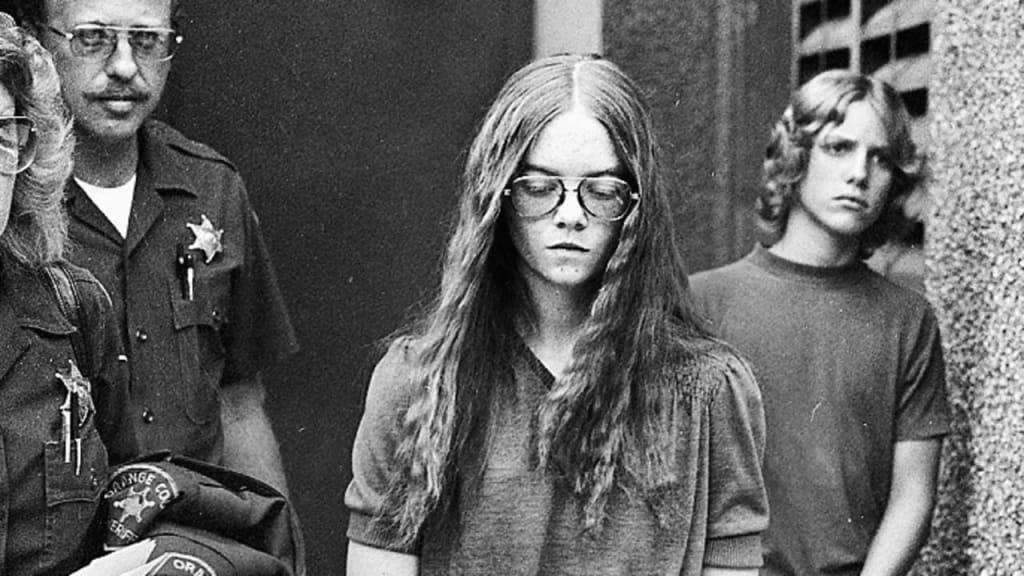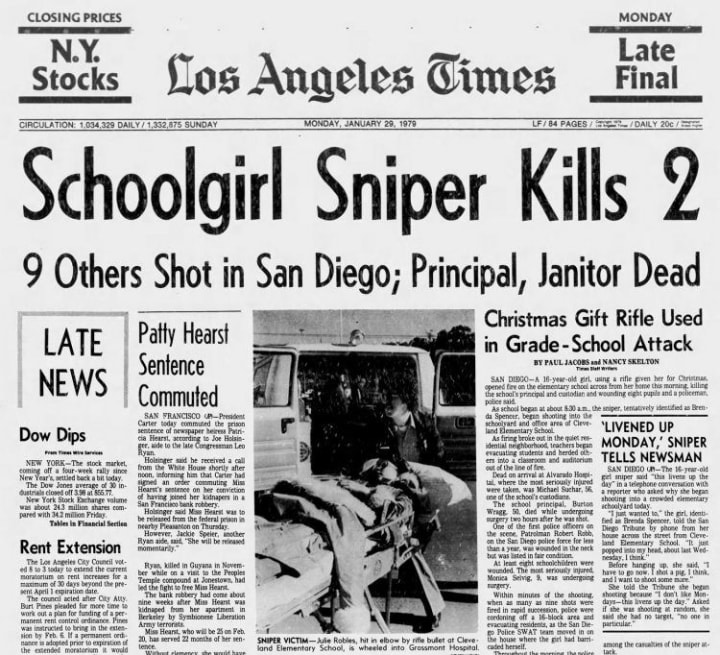"I Don't Like Mondays"
How Brenda Spencer became the first-ever female school shooter and inspired a hit song.

America has a history of school shootings dating all the way back to 1764 in which the schoolmaster of a settlers' log schoolhouse and ten students were killed during Pontiac's Rebellion. The ones that most likely come to mind are those with the highest body counts, which include the ones committed at Virginia Tech (the highest one to date with thirty-three deaths), Columbine High School, and Sandy Hook Elementary School. As shocking as those were, many people might be unfamiliar with the first-ever school shooting committed by a female. She may not have had the highest body count, but she managed to carry it all out without having to step foot onto the property. Brenda Ann Spencer told those around her that she wanted to do something big to get on TV, and she got her wish.
Mondays are not always the best, but it was a particularly bad day for the students at Grover Cleveland Elementary School in San Diego on January 29, 1979. Nine-year-old Charles “Cam” Miller was waiting patiently for the principal to let the students into the building when he was shot through the chest and out his back. He was lucky enough to survive, and he now has a scar on his chest as a reminder of what happened. Amazingly, the eight children who were shot managed to survive. Even a cop who responded to a call for help lived after getting shot in the neck. Sadly, Principal Burton Wragg and custodian Mike Suchar were killed as they tried to rescue others. It wasn't until a garbage truck was moved in front of the scene that the shooting stopped, and it would take seven hours for the shooter to finally be escorted out of the neighborhood. At one point during those seven hours, a reporter from The San Diego Union-Tribune was randomly calling telephone numbers in the neighborhood, trying to find out what was happening. 16-year-old Brenda Spencer picked up the phone and confessed that she did it. When asked why she did it, she responded, "I don't like Mondays. This livens up the day."

Why would a child commit murder? Is it due to a rough upbringing? A series of misfortunate? A thirst for blood that appeared out of nowhere? For Brenda Spencer, it looks like a plethora of things contributed to the cause. For one, Wallace Spencer was raising his daughter after he and his wife Dot had separated. The two of them slept on a single mattress in the living room of a house filled with beer bottles. In 2001, 22 years after firing at school children, Spencer claimed that her father was abusive, which he denied. Even if he didn't abuse her physically, he certainly didn't take her mental health seriously. Despite being a skilled photographer and winning a Humane Society competition, Spencer had no interest in school. Her continuous accounts of truancy sent her to a facility for problem students, where the staff discovered that she was suicidal and informed her parents of the fact. Instead of taking his daughter's mental health seriously, Wallace Spencer refused to have her admitted to a mental hospital and didn't bother to give her the radio she asked for Christmas. Instead, he gave her a Ruger 10/22 semi-automatic .22 caliber rifle with a telescopic sight and 500 rounds of ammunition. "I felt like he wanted me to kill myself," Spencer answered when asked why her father would give her such a present that she didn't ask for.
The temporal lobe is one of the four major lobes of the cerebral cortex in the brain. It's involved in processing sensory input into derived meanings for the appropriate retention of visual memory, language comprehension, and emotion association. Damage to the lobe could result in a variety of effects like difficulty in recalling visual stimuli, visual agnosia (impairment in recognizing familiar objects), and prosopagnosia (impairment in the recognition of faces). Another possible result is temporal lobe epilepsy, which can greatly affect one's personality and cause depression. When Spencer was taken into custody, it was revealed that she was epileptic and had received damage to her temporal lobe after an accident on her bike. While I don't know for sure if the epilepsy was caused by this or when her accident occurred, it could explain some red flags prior to the shootings. Not only did she once speak about her desire to shoot a cop, but she also hunted birds in her neighborhood. Ironically, she was arrested for shooting out the windows of Grover Cleveland Elementary School with a BB gun and for burglary long before she turned her attention to the kids. One of the many effects of temporal lobe epilepsy is aggressive rage. It could be argued that Spencer committed the shooting because of all this bottled rage she had inside of her. When her father gave her that rifle instead of the radio that she had asked for, she accepted that no one cared about her. Rather than kill herself like she thought her father wanted her to do, she decided to punish others. She probably thought that she wouldn't amount to anything, so she might as well leave her legacy in an infamous way.
Honestly, Spencer probably wouldn't have been so infamous if it wasn't for a little song called "I Don't Like Mondays" by Irish rock band The Boomtown Rats. Their lead singer, Bob Geldof, read a telex report about the 16-year-old at Georgia State University's campus radio station, WRAS. He stated, "It was such a senseless act. It was the perfect senseless act, and this was the perfect senseless reason for doing it. So, perhaps I wrote the perfect senseless song to illustrate it. It wasn't an attempt to exploit tragedy." Despite the Spencer family's attempts to prevent the single from being released in the United States and San Diego's refusal to play it on the radio, it still managed to reach #73 on the Billboard Hot 100. It also became the band's second single to reach #1 on the UK chart, topped the Irish Singles Chart, and won the Best Pop Song and Outstanding British Lyric categories at the Ivor Novello Awards. Even with all that success, the song came with a bit of a price. Spencer wrote to Geldof stating that she was glad that she did what she did because his song made her famous. He now regrets writing that song because that's why so many people know of Spencer and her actions.
The reason why I am so drawn to that Monday morning in 1979 is that it was all carried out by a girl and because of Spencer's reasoning for what she did. I've heard some pretty crazy reasons for why people commit murder, but "I don't like Mondays" really grabbed my attention. I was curious to know why she said that. Do bad things generally happen to her on Mondays? Did she just say that as a way to be remembered? I don't necessarily feel bad for her because she seriously had no reason to fire at those children and murder those two men, but there is no doubt that her father has blood on his hands for not giving her what she needed. No matter who is to blame, Spencer has spent most of her life in prison. She has been denied parole four times and is eligible again this September. During her first hearing, she claimed that she was a user of drugs and alcohol at the time, but her drug tests came back negative while in custody. Given the fact that she was not intoxicated at the time, her bizarre reasoning, and her response to the song "I Don't Like Mondays", so many people are convinced that she has no remorse and believe that she should spend the rest of her life in prison. What really upsets me about the whole thing is that nothing has really changed. Not only is American history stained with the blood of Columbine and several other schools, but a similar event occurred nearly a decade later. On January 17, 1989, five students were killed and thirty-two were injured at a school in Stockton, California that was also named Grover Cleveland Elementary. It was the deadliest school shooting in the eighties and the deadliest non-college school shooting until Columbine, and even though no school shooting has surpassed the record held by Virginia Tech, they continue to occur. Out of all the true crime stories I could've covered today, I picked the story of Brenda Spencer due to her bizarre reasoning for carrying out the event and the song that made her famous. If you ever complain about Mondays, you better be Garfield and not Brenda Spencer.
About the Creator
Catherine Burford
I'm just your everyday Autistic Artist.






Comments
There are no comments for this story
Be the first to respond and start the conversation.